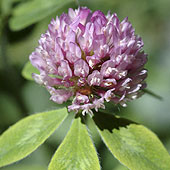Red Clover - Natural Health Product
Non-traditional solutions to help boost your health and wellness.
Red Clover
General Information
Like peas and beans, red clover belongs to the family of plants called legumes. Red clover contains phytoestrogens – compounds similar to the female hormone estrogen.
Common Name(s)
Scientific Name(s)
Trifolium pratense

How is this product usually used?
The flowering tops of the red clover plant are used to prepare extracts available in tablets and capsules, as well as in teas and liquid forms.
For prevention of loss of bone mineral density (BMD), hot flashes, and/or night sweats, 40 mg to 100 mg total aglycon isoflavone equivalents (AIE) is used per day.
If you are using red clover to prevent BMD loss, use it for at least 6 months to see beneficial effects. If you are using it to reduce hot flashes and/or night sweats, use it for several weeks.
Your health care provider may have recommended using this product in other ways. Contact a health care provider if you have questions.
What is this product used for?
Historically, red clover has been used to prevent cancer and to treat respiratory problems such as whooping cough, asthma, and bronchitis.
Red clover is currently used for menopausal symptoms such as hot flashes and night sweats, breast pain associated with menstrual cycles, high cholesterol, and symptoms of prostate enlargement. It is also used to reduce the loss of bone mineral density in post-menopausal people.
Your health care provider may have recommended this product for other conditions. Contact a health care provider if you have questions.
What else should I be aware of?
Consult a health care practitioner if:
- you have a history of disease related to female hormone such as ovarian cancer, uterine fibroids, or endometriosis
- you experience symptoms such as breast pain, soreness, tenderness, or uterine bleeding after starting red clover
- you are taking hormone replacement therapy
In addition, anytime when the symptoms worsen, you should consult a health care practitioner.
Currently, the evidence is conflicting for the effect of red clover on menopausal and postmenopausal symptoms. There is not enough scientific evidence to determine whether red clover is effective for any other health conditions.
Red clover seems to be safe for most adults when used for short periods of time. No serious adverse effects have been reported. Common side effects include muscle pain, nausea, and vaginal spotting.
Because red clover contains estrogen-like compounds, there is a possibility that its long-term use may increase the risk of people developing cancer of the lining of the uterus. Be sure to complete clinical testing such as any mammograms or ultrasound scans of the lining of the uterus before taking red clover.
Red clover may interact with:
- medications that use estrogen receptors such as oral contraceptive drugs and estrogen replacement therapy.
- methotrexate
- tamoxifen
It is unclear whether red clover is safe for people who are pregnant or breast-feeding, or who have breast cancer or other hormone-sensitive cancers.
Before taking any new medications, including natural health products, speak to your physician, pharmacist, or other health care provider. Tell your health care provider about any natural health products you may be taking.
Source(s)
- Health Canada. Drugs and Health Products. Red Clover Isoflavone Extract. https://webprod.hc-sc.gc.ca/nhpid-bdipsn/atReq.do?atid=rcie&lang=eng.
- Natural Medicines Comprehensive Database. Red Clover.
All material copyright MediResource Inc. 1996 – 2020. Terms and conditions of use. The contents herein are for informational purposes only. Always seek the advice of your physician or other qualified health provider with any questions you may have regarding a medical condition.


